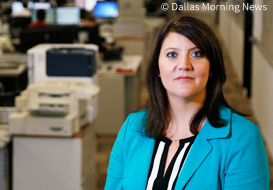© 2015 The Texas Lawbook.
By Mark Curriden
NEW YORK (Aug. 27) – Thirty lawyers, investment bankers and financial advisers involved in the Energy Future Holdings bankruptcy packed into a 50th floor conference room at Kirkland & Ellis’s office in New York City in June. Another dozen were on speakerphone.
EFH was entering its 15th month in bankruptcy. Two previous restructuring plans failed and efforts to put together the third option was quickly falling apart. The Dallas energy giant’s reorganization efforts were stalled in a state of inertia.
As the bankruptcy professionals – nearly all of them New Yorkers, most of them older and middle-aged white men, many of them earning $1,000 or more per hour – bantered and bickered, one of the few women in the room had finally had enough.
“For God’s sake,” EFH General Counsel Stacey Doré blurted out in utter frustration, her southern Louisiana accent not hiding her obvious discontent with the situation, “it is time to get this deal done and move forward.”

While Ray Hunt and his team got public credit for the Oncor deal, legal and financial analysts involved in the transaction say Doré was the quiet behind-the-scenes architect.
“This deal would never have gotten done without Stacey and her advocacy,” said Andrew Calder, a partner in the Houston office of Kirkland, which represents EFH in the bankruptcy and the sale of Oncor. “Stacey reviewed every document. She was there at nearly every negotiation and participated in just about every phone call.

Doré declines to discuss specifics about the Oncor sale, but admits it was a positive move toward getting to a final exit plan.
“I’ve been asked how long so many times and I’ve been wrong every time,” Doré said recently in an exclusive interview with The Texas Lawbook. “I try to communicate truthfully and I don’t speak in absolutes. This process is so unpredictable.
“We are making progress,” she said. “I feel good. We are gaining momentum. There’s still a long way to go.”
No business lawyer in Texas is under more pressure or scrutiny these days than Doré. Seemingly everyone – the federal bankruptcy judge, creditors, investment bankers, the U.S. Department of Justice, EFH’s board of directors, Texas energy regulators and TXU’s 1.7 million electric customers – is watching and second guessing her every decision.
But lawyers with intimate knowledge of the situation say that EFH’s executive leadership and board specifically chose Doré to be the general counsel in 2012 to lead the company through what it knew could be a long and contentious bankruptcy.
“Stacey is EFH’s Joan of Arc,” said Rob Walters, EFH’s former general counsel and now a partner at Gibson, Dunn & Crutcher in Dallas. “There is no one better to find and execute the exact business and legal solution for EFH.

At age 43, Doré is one of the few women corporate general counsel at a Fortune 500 company and she is certainly one of the youngest. She finds herself leading one of the largest business bankruptcies in U.S. history, even though she had no prior bankruptcy law experience.
“People ask me all the time if I knew what I was getting into when I took the job in 2012,” Doré said. “Of course I did. Our need to file bankruptcy was the worst kept secret on Earth.”
The decisions in filing bankruptcy may have been difficult, but those who know Doré say it isn’t close to being the toughest decision of her life.
“Despite the legal pickle we find ourselves in and all the hours we are working, Stacey remains very family focused,” said EFH Deputy General Counsel Andrew Wright, who points out that Doré is part of a group that meets at 4:30 a.m. three days a week at White Rock Lake to train for half-marathons. “She wakes up early every morning to make her kids breakfast and get them off to school.”
Doré, who has two sons, ages nine and 12, grew up in Crowley, Louisiana, which is known as the rice capital of the U.S. Her grandparents were rice farmers. Her mom was a secretary. Doré received a full scholarship in 1990 to study journalism at Northwestern University in Illinois.
“I swore I would leave Louisiana and never look back,” she said. “But I lasted only one week. I was a small town girl in a big city and I missed home.”
While studying journalism at the University of Louisiana at Lafayette, a professor encouraged her to apply to law school. She did and Harvard accepted.
In 1995, during her second year at Harvard Law, Doré received bad news. Her father was seriously ill and was dying from a kidney disease.
At age 23, she donated a kidney to her dad.
“The great news is that my dad is still alive and doing well,” she said. “It puts all these other issues in perspective.”
Doré excelled in law school, graduating near the top of her class. Large law firms came calling. One was Houston-based Vinson & Elkins.
“Stacey was white-hot smart,” said Walters, who was a partner in V&E’s Dallas office in 1997 and Doré’s eventual mentor. “She had this quiet confidence about her. Nobody outworked her. And she always did the right thing, even when no one was watching.”
Doré worked for Walters in V&E’s litigation practice.
“We were representing Blockbuster in a huge bet-the-company antitrust lawsuit and Stacey, who was just a fourth year associate, was so impressive that Blockbuster’s general counsel demanded that she be one of the lead lawyers on the case,” Walters said.
In fact, Blockbuster tapped Doré to argue the key legal motion before a California state judge that would decide whether a class action lawsuit by major movie studios would proceed to trial. More than a billion dollars was at stake.
“Stacey went head-to-head in this hearing against some of the biggest law firms in the country and beat them,” Walters said.
At the end of the hearing, Los Angeles Superior Court Judge Victoria Chaney said it was the “finest performance” she had ever seen from a young lawyer.
In 2001, during her fourth year at V&E, Doré made another life and career-altering decision.
“I was working a lot – about 300 hours a month,” she said. “I missed my husband and my family. I wasn’t sure that I wanted to do this anymore. My father was very sick again and I decided family was much more important.”
Doré told Walters that she planned to quit her job and move back to Crowley, but Walters convinced the young star to telecommute from southern Louisiana. She did and the courtroom victories kept mounting.
In 2007, private equity firms KKR and TPG Capital purchased TXU Electric for $45 billion. It was largest leveraged buyout in history. The new owners hired Walters to be the general counsel of the newly created parent company, which they named Energy Future Holdings.
Walters hired a couple V&E lawyers to fill key positions, including Doré to be the company’s head of litigation. She was later promoted to general counsel of EFH’s subsidiary, Luminant Generation.
Within weeks of taking the job, Alcoa Inc. filed a huge lawsuit against Luminant for breach of contract related to the supply of power to two of the aluminum giant’s facilities. Alcoa sought $500 million in damages for breaching one of the agreements and another $50 million for the second.
Once again, Doré faced a major decision: Go to trial and risk a huge jury verdict or cut a deal with Alcoa, as a great majority of companies do.
“It would have been very easy for Stacey to run for the door and settle out of court,” said Marshall Searcy, a partner at Kelly, Hart & Hallman who worked on the case with Doré. “It was clear during the trial that Stacey thrives on making tough decisions.”
Barry Barnett, a partner at Susman Godfrey in Dallas, said Doré insisted on having an active role in the trial.
“Most corporate in-house lawyers don’t feel comfortable getting involved in trials, but Stacey actually examined witnesses and argued motions,” Barnett said. “Stacey has true gravitas.”
The Milam County jury not only rejected all of Alcoa’s claims, it actually awarded millions of dollars to Luminant.
“We had a team of great trial lawyers, but there was no doubt that Stacey was in charge. She was the general,” Searcy said. “I have a rating system for lawyers. I rate their knowledge of the law, how hard they work and how good their judgment is.
“Stacey is top 10 in every measurement,” he said. “She is a great lawyer.”
When Walters resigned as EFH’s general counsel in 2011, he recommended Doré for the position. Some board members initially opposed Doré’s appointment because they thought she was too young.
EFH CEO John Young decided Doré was the right choice and officially gave her the job in March 2012.
“I saw a leader who knew the company well, who knew our issues better than anyone from the outside and had a tremendous upside,” Young said in an email. “She is a phenomenal general counsel.”
Three months after becoming EFH’s top lawyer, Doré made a critical decision regarding the power company’s future: she hired law firm powerhouse Kirkland & Ellis to be its lead legal adviser in bankruptcy court.
“I did my research and discovered there are only four law firms that have the depth and expertise to handle a bankruptcy this size,” she said. “Kirkland had the most experience representing the energy industry in restructuring and Kirkland lawyers historically don’t employ scorched-earth tactics.
“This is a balance sheet restructuring, not an operational restructuring,” she said. “This bankruptcy is completely about our debt.”
Doré has very few critics. Even those who disagree with her decisions refuse to speak ill of her on-the-record.
The two biggest criticisms Doré has faced regard her decision to file bankruptcy in Delaware instead of Dallas and the cost of the legal and financial advisers in the bankruptcy.
North Texas bankruptcy lawyers say the filing of Chapter 11 restructuring in Delaware meant that East Coast lawyers and businesses would be hired to handle the case instead of those in Dallas.
In court testimony last year, Doré said EFH is actually saving money by having the bankruptcy in Delaware courts because so many of the financial advisers and creditors are based on the East Coast. It cost them less to travel to Delaware than it would to Dallas, she said.
Many of those same naysayers chide Doré for employing expensive legal and financial advisers, who are charging EFH about $625,000 a day in fees. Even Doré, in an interview, called the fees outrageous, but she and others point out that there’s very little she can do about it because the fees are approved by the judge.
“Because Stacey is not a seasoned bankruptcy lawyer, I think she was probably naïve about the bankruptcy bar feeding off of EFH,” Walters said.
Former American Airlines General Counsel Gary Kennedy, who guided the Fort Worth-based airline through Chapter 11 two years ago, said that the lawyers and financial advisers in these large bankruptcies work together in cases all across the country and can sometimes wrestle control of a case away from the general counsel.
“Stacey is viewed as the outsider, as I was,” Kennedy said. “These folks have a certain way of doing things and if you don’t watch out, they will run all over you, especially if they view you as weak or inexperienced.”
Wright, who has been in every meeting regarding the bankruptcy, said the lawyers and financial advisers know Doré is in charge.
“The bankruptcy bar is a male-dominated world and there are a lot of meetings where Stacey is one of the only women in the room,” Wright said. “But I promise you that Stacey is not passive. She lets those lawyers know her point of view. She doesn’t hesitate to let them know she is frustrated with them or the process.”
 Sitting in her modest window office on the 41st floor of Energy Plaza in downtown Dallas, Doré picks up an EFH-branded Rubik’s cube on her desk. On each side is a phrase: “See it. Own it. Solve it.”
Sitting in her modest window office on the 41st floor of Energy Plaza in downtown Dallas, Doré picks up an EFH-branded Rubik’s cube on her desk. On each side is a phrase: “See it. Own it. Solve it.”
“That’s our team’s motto,” she said, referring to the 25 lawyers who work for her at EFH. “Our job is to identify the issues or problems and come up with solutions. But we must do it with integrity and we must always do what is in the best interest of the company.”
Lawyers involved in the bankruptcy case say Doré invoked her “See it, Own it, Solve it” approach during many of the meetings in New York that led to the Oncor agreement.
Wright, who is Doré’s top deputy at EFH, said his boss may not have been a bankruptcy expert before she became EFH’s general counsel, but she is now.
“Our bankruptcy advisers have learned that Stacey is a GC who likes to practice law and get involved in the details – not just be a manager,” he said.
“In everyone of the meetings, one thing is clear,” Wright said, “Stacey is clearly the smartest person in the room.”
© 2015 The Texas Lawbook. Content of The Texas Lawbook is controlled and protected by specific licensing agreements with our subscribers and under federal copyright laws. Any distribution of this content without the consent of The Texas Lawbook is prohibited.
If you see any inaccuracy in any article in The Texas Lawbook, please contact us. Our goal is content that is 100% true and accurate. Thank you.
